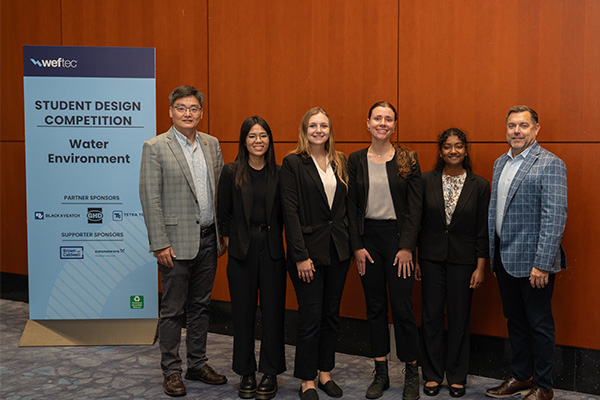Engineering student-brewers explore the science behind beer
“Introduction to Zymurgy” allows seniors to learn principles of chemistry while brewing their own ales and stouts

“Introduction to Zymurgy” is the perfect class for a second-semester senior: It’s collaborative, low stress and requires students to attend field trips that provide free samples of beer.
The course, offered through the Department of Energy, Environmental & Chemical Engineering at the McKelvey School of Engineering, teaches chemistry phenomena through “zymurgy,” or the study of fermentation in brewing or distilling. Students must be at least 21 years old to enroll in the course, which is only offered in the spring.
“It’s a pretty laid-back class,” said Anna Oneto, a Dual-Degree Program student studying biomedical engineering. “Everyone is there because they want to be, not because they have to be. I love it and am having a good time.”
“Laid-back” doesn’t mean easy, however. Students in the course must take part in three brewing labs, which emphasize different principles such as heat transfer, heat extraction and the production of diacetyl, a by-product of fermentation that can alter the taste of beer.
“I originally didn't know anything about brewing beer or how technical it was,” said Alex Marchok, a senior studying chemical engineering. “There’s a lot of chemistry and biology behind it that’s really interesting.”
While the brewing process can be very scientific, students do have some creative freedom with the lab work such as the type of beer they brew as well as the flavors they include in their recipes.
Marchok’s team brewed an Irish red ale, a chocolate stout and a mango sour. Oneto’s team attempted to brew replicas of three manufactured beers including an India pale ale, a Mexican hot chocolate-flavored imperial stout and a Saison-style pale ale.
“Beer-making is a science and an art at the same time,” Marchok said. “It’s more than knowing how long to steep your grains; it's also having a feel of what makes a good beer. We’re brewing based off recipes, but the brewers we’re visiting create their own recipes.”
Final fermentation of the beer isn’t complete until at least six weeks after brewing, and then students are required to bottle and label their products. The semester ends with a tasting and evaluation of the beers.
Marchok and Oneto say they’ve appreciated the camaraderie and practical knowledge the course provided them. Both also said they hope to continue brewing after they complete the course and graduate from Washington University in St. Louis.
“This biggest asset of this class is that you’re learning while doing,” Oneto said. “It gives you the opportunity to be an engineer rather than getting information thrown at you with no space to apply it.”
Ray Ehrhard, senior lecturer of energy, environmental & chemical engineering, has taught the course for the past three years and worked with a group of students to develop the curriculum. Brewing is a personal passion for him as well, and that’s something that comes out in his teaching.
"He's probably one of the coolest professors I've ever had,” Oneto said. “He really loves beer and wants to teach other people how to make it. He doesn't really stifle creativity unless it's going to break the equipment. Otherwise, he's like, ‘I'm here to have fun, and I'm pretty sure you guys are here for fun, too.”



